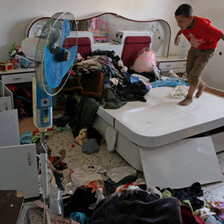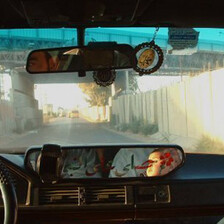The Electronic Intifada Deir al-Balah 2 August 2014

Israel fired more than ten tank shells at an iconic ice cream and cookie factory in Deir al-Balah in the central Gaza Strip late on Thursday night, starting a fire that continued to blaze into the next day.
The attack puts hundreds of people out of work and destroyed vital medicine stocks that had been stored in the building.
Surrounded by a few workers and an administrator attempting to assess the damage to the 1.5-acre facility, Iyad al-Tilbani, whose father owns the 38-year-old Al-Awda Factory, said on Friday that much of the building was “reduced to rubble overnight.” As he spoke, a bulldozer cleaned up debris in the background.
The Electronic Intifada met with al-Tilbani while reporting about the damage during a supposed 72-hour humanitarian truce brokered by the US and UN that was to take effect on Friday morning.
Israel ended the truce after less than two hours, launching a massive artillery barrage in Rafah, southern Gaza, that killed dozens of people, using the pretext of a clash between resistance fighters and Israeli forces occupying Gaza which left two Israeli soldiers dead and one missing.
“For the second consecutive day, rescue teams have not been able to reach our factory due to the intensity of the fire inside,” al-Tilbani, 37, told The Electronic Intifada. “The civil defense teams here fear harm by Israeli tank shells that have continued to fall unabated over the past 48 hours.”
“Helpless”
Al-Tilbani said that late Thursday night, he and several workers were at the factory when tank shells “fired from about two kilometers away” began falling onto the factory’s fuel tanks.
“It was such a horrible and rather shocking moment for me — I stood helpless in the face of what was happening,” the Gaza businessman said. He pointed to the place where modern, western-made machines were buzzing just a few days ago, but which have been replaced by silence and destruction.
Al-Tilbani estimated the damage to their factory at about $20 million.“ ‘May we be patient enough to bear such a life-time loss’ — that was my father’s response when I told him about the shelling of our factory,” he said.
His parents had just finished a pilgrimage to Mecca in Saudi Arabia and had not been able to return to Gaza, due to the current crisis. Al-Tilbani said that they headed for the West Bank instead.
“I thank God that my father was not present when the factory was destroyed — maybe he would have had a stroke if he saw his life’s work demolished overnight,” he said.
Al-Tilbani added that Israel’s massacres in Gaza “seem unprecedented and more devastating” than the two most recent wars on Gaza. “It was the first time that they [Israel] hit our facility. Is our factory producing weapons of mass destruction or missiles that threaten the existence of Israel?”
“With his own hands”
The Al-Awda Factory has been standing in the same place for the past four decades, producing sweets for local and international markets.
“My father, Muhammad, began operating this factory after he first wrapped cookies and candies with his own hands and the hands of my mother and other family members in the Maghazi refugee camp, where my family moved after Israel expelled hundreds of thousands of refugees back in 1948,” al-Tilbani said.
“What do the Israelis want by attacking one of the long-standing pillars of Gaza’s economy?” he asked.
Everything in the factory “was wiped out, including tons of finished cookies, butter, wheat and packages,” explained al-Tilbani. “Nothing remains intact here except for the building structure.”
The Al-Awda Factory had employed 500 people who worked in two shifts and was therefore able to support thousands of family members, including children, he said, as pillars of black smoke still rose into the sky over Deir al-Balah. “Now the factory will probably not function again, as the magnitude of damage is far beyond our capacity.”
Attacks on other factories
The Al-Awda Factory is not the only Gaza industrial facility which has been hit during Israel’s current bombardment.
In the last two days of Israel’s escalations, a carbonated drinks factory in the al-Zaytoun neighborhood in southeastern Gaza City and a carton factory in the middle of Nuseirat were also damaged by Israeli army strikes.
After 27 days of relentless bombardment, thousands of residential buildings, businesses and other basic infrastructure have been destroyed or damaged, with a cost that could run into billions of dollars. Israel also bombed Gaza’s sole power plant and power lines in the eastern and northern areas.
“We accepted a request from the Palestine Red Crescent Society to store two truck-loads of rare medicines in our [factory’s] large refrigerators … as Gaza has been plunged into darkness,” al-Tilbani said over the noise of workers who were busy knocking down a part of the factory’s wall in order to salvage some equipment. The smoke and fire were making it difficult for them to work.
“Unfortunately, the medicines were destroyed,” al-Tilbani said. “Now, neither their medicines nor our products will reach Gaza residents.”
Rami Almeghari is a journalist and university lecturer based in the Gaza Strip.





